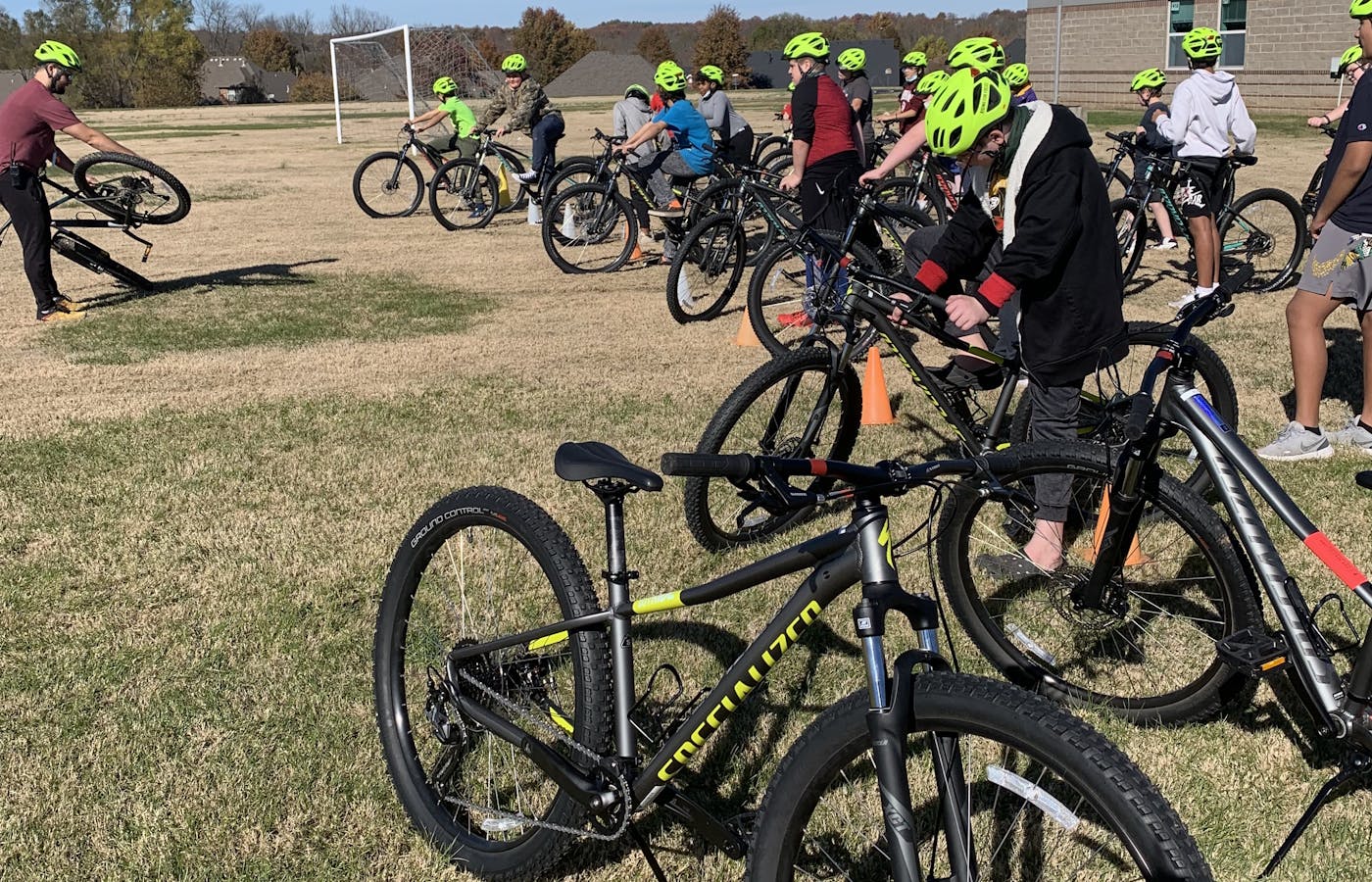Northwest Arkansas Schools Go Big on Bikes
By: Kiran Herbert, PeopleForBikes' content manager

The state's northwest corner is taking a holistic approach to nurturing cycling among students and teachers.
In 2020, Bentonville, Arkansas, declared itself the “Mountain Biking Capital of the World.” While a somewhat arbitrary designation, the move was well-warranted: For the past 15 years, the city has made large investments in bicycling, much of it backed by the Waltons, Walmart’s founding family. In Northwest Arkansas (NWA) — a metropolitan area clustered in the Ozark Mountains that includes the cities of Bentonville, Fayetteville, Rogers, and Springdale — there are more than 500 miles of bike trails.
The regional focus is now on expanding beyond mountain biking to create a more robust cycling culture, emphasizing accessibility and connectivity and bringing in folks from a diversity of backgrounds. That strategy includes making mountain bike trails more inclusive, teaching adults how to ride, and graduating more advanced bike technicians. No holistic cycling strategy would be complete, however, without also putting an emphasis on youth. From bicycling units in physical education classes to professional development opportunities for teachers, NWA schools are going all in on bikes.
Starting in 2010, there was a big regional push for bicycling in Northwest Arkansas schools. Over the next four years, every school in Bentonville, Fayetteville, and Springdale, as well as some of the schools in Rogers, received a fleet of bikes and helmets. By all accounts, the new bikes were a welcome windfall, although not all schools were well-positioned to take advantage of them in the same way. In the years since, what’s become obvious is that simply having bikes isn’t enough to make biking ubiquitous — schools need a strategy for how to best put them to use.
Anya Bruhin, the former bike education program manager at Trailblazers, a regional nonprofit dedicated to bicycle advocacy, has been working with Northwest Arkansas schools to break down barriers to bike use among teachers.
“There’s no Arkansas state standard in physical education to teach bikes, so those teachers that do it, do it because their administrator asks them to or because they want to,” says Bruhin, noting that some schools with bikes have no bike curriculum. “You’re not going to teach something you’re not already passionate about, especially in P.E.”
Bruhin, who spent a decade working as a public school art teacher, has been working to get more educators passionate about bicycling. Well aware that professional development opportunities for teachers are often geared towards academics, she dreamed up a course that would appeal specifically to P.E. teachers. Bruhin adapted her method for teaching National Interscholastic Cycling Association (NICA) coaches and on October 13, 2021, she hired 14 coaches of her own and introduced about 75 Bentonville P.E. teachers and several administrators to mountain biking.
“It poured all day, which actually ended up being great because we got to show them that there are ways to be adaptable,” says Bruhin. “You can find different covered areas, you can do a couple of games in the rain, or you can work in your gym — you don't have to cancel your biking session and your P.E. class just because the weather isn't cooperating.”
All of the teachers started at different skill levels and were sorted according to a survey they took beforehand. The groups played games, participated in challenges, and learned many ways in which a biking curriculum doesn’t need to require access to trails. After receiving stellar feedback from participants, Bruhin realized the program couldn’t just be a one-and-done. She decided to continue it as a selective thread for professional development and has offered several iterations since, the most recent of which put an emphasis on well-being.
“We ask so much of our teachers, and I built these bike days as a way to give back,” says Bruhin. “It’s an opportunity for teachers to get on a bike, explore the network for themselves, figure out how they can incorporate biking into their daily lives, get some fresh air, sunshine, and exercise, and just fill their cup up.”
Bruhin’s method is based on the idea that the more fun teachers have on a bike, the more likely they are to spread that joy in the classroom. In addition to working with Bentonville public schools, Bruhin did some work in Rogers and hopes to expand as more regional schools show an interest. Bruhin also worked in partnership with Emma Armendariz, who was hired last year as the sustainability and bike education coordinator at Fayetteville Public Schools. Armendariz’s position was created in order to make bicycling a priority and oversee Fayetteville’s fleet of youth bikes and helmets. The school district saw that in order to maintain robust elementary, middle, and high school bike programs, there needed to be a main point of contact.
In 2014, when Fayetteville Public Schools received its bikes, it also received a curriculum for P.E. teachers to use with them. Over the years, some Fayetteville elementary schools have also incorporated Strider’s All Kids Bike Kindergarten PE Program, while a few middle schools use Outride’s Riding for Focus curriculum (both are essentially plug-and-play offerings, available to schools across the U.S.). In her role, Armendariz has been able to identify things that need to change and maintain streamlined teaching materials that are suited to Fayetteville specifically. Because her role also handles sustainability for the district, she’s also working to get more students and teachers commuting by bike or foot.
“In 2019, Fayetteville set the goal of expanding its bike network to be within a quarter mile of all residents,” says Armendariz, noting that the city is currently at about 75-85% completion. “So all of our students are almost able to access a safe, non-motorized way to get to school but the majority of people are commuting by bus or cars. We need to support students and staff with the knowledge and resources to safely use our trail system.”
Occasionally, Armendariz will organize bike trains to make riding to school more accessible but that’s not something schools can realistically offer daily. In Fayetteville, students bike in elementary and middle school through P.E. and are able to continue it throughout high school as an outdoor education elective. The district also offers adaptive bikes for students with disabilities and for students that transfer schools or just need more instruction, one-on-one help is available.
“It's a fine line between saying, ‘Well, this is part of our curriculum and you have to try this activity,’ and saying, ‘This is something that is going to be a lifelong skill that we think would really benefit you if you can just give it a shot,’” says Armendariz. “We always try and encourage kids to give biking a try and then if it's not really clicking with them, then we’ll move to one-on-one support.”
Armendariz sees the district-wide emphasis on bicycling as key to building a more robust cycling community in the region. By including bikes as part of the school curriculum, students are able to experience the known benefits of bicycling no matter their family’s economic status. Roughly 40% of Fayetteville students are low-income and many are people of color. Oftentimes, those students don’t have bikes at home or are unable to attend after-school activities. By including bicycling as a taxpayer benefit, they’re given the same opportunities as everyone else.
“We're always looking for ways to break down those barriers and make things more equitable for everyone, regardless of ability or background or income or whatever,” says Armendariz.
Of course, there’s still room to grow. Armendariz hopes to introduce an elective “Biking for Transportation” class, which will emphasize bicycling for everyday use rather than just for sport. She also acknowledges that there’s more room for mechanics instruction (it’s currently only offered in one school, which maintains the district’s bike fleet), as well as a public after-school bike program (right now, NICA remains a student’s best option).
Through her work with Northwest Arkansas public schools, as well as with the nonprofit Trailblazers, Bruhin has likewise identified a few things any school can do to increase bicycling amongst its teachers and students:
- Issue fun bike challenges, which can offer incentives for people to change their habits.
- Create a stipend for someone that wants to lead a bike bus to school — it’s a lot to ask teachers to volunteer their time to do this.
- Make sure there’s good bike parking (ideally covered, convenient, and accessible to a large number of riders).
- Create a ride group for teachers. In Fayetteville, an administrator’s ride group was started by the superintendent himself, John L. Colbert.
- Incorporate field day activities that include bikes. Let advocates in the community and family members that want to volunteer help with a bike rodeo, a bicycle course, or a fall bike festival.
Perhaps most importantly, if your school happens to already have a bicycle program, Bruhin encourages folks to write a letter, to their teacher, administrator, or even district administration, saying, ‘Thank you.’ Send a picture alongside your words of appreciation — showing the real-world benefits these programs have on students only strengthens them. After all, the more schools get intentional about bicycling, the better.
Related Topics:

